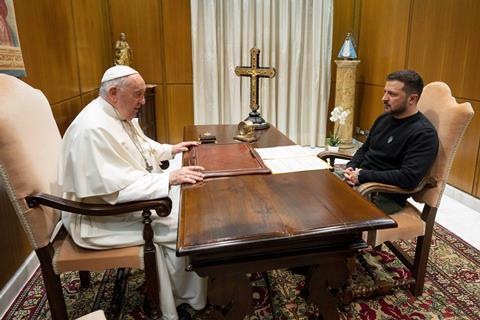Church leaders are wasting their time when they call for Ukraine to negotiate or for Russia to retreat. There’s a reason why they aren’t being listened to, explains John Heathershaw

In recent weeks, church leaders have struggled to make sense of the war in Ukraine.
General Synod heard a report which apparently advocated church neutrality. Following an outcry from many Ukrainians, Synod eventually voted for an amendment which reaffirmed condemnation of the invasion.
Meanwhile, the Pope caused controversy by appearing to suggest that Ukraine should have the courage to “raise the white flag and to negotiate”. The Vatican later clarified the papal comments, with Cardinal Pietro Parolin, the second-highest ranking official after Francis, telling Italian newspaper Corriere della Sera that Russia “should first and foremost cease fire.” But it was too late. Pope Francis had already handed a PR victory to the Kremlin.
Why do church leaders make such gaffes? One explanation could simply be political naivete.
But I think there is a bigger reason. Both the Anglicans and Roman Catholics emerged from “Christendom”, the period of church history where privileged relations with governments were the norm. This appears to make them relevant, but it comes with two big pieces of baggage.
First, they feel duty bound to advise and minister to politicians and generals. Thus, prominent Anglican theologians have sought to apply Christendom ideas such as “just war” to justify the West arming Ukraine to defeat Russia, without considering whether this likely to help or lead to escalation.
Second, they have historically strong relations with other Christendom churches, including the Russian Orthodox Church (ROC). They may have little sympathy for the ROC’s justifications of Putin’s war, but they will not condemn the ROC outright nor call for its expulsion from the World Council of Churches.
As Christendom has ended so too must the delusion that the political authorities will listen to the church
Stuck between these two commitments, it’s little wonder that Synod and the Vatican are calling for “peace”. With hundreds of thousands having already died in a war of attrition that shows no sign of ending, this is understandable.
But there is a longstanding problem: calls for peace from these church leaders are being ignored because Christendom is dead. Mutual support between state and church in the West have been in terminal decline since the middle of the last century. In the eastern Orthodox world, this decline appears to have been reversed in the decades since the end of the Soviet Union. But look more closely and what the Orthodox call “symphonia” between church and state is a corrupt and brittle project. As some orthodox theologians have declared, the national churches of Christendom often made idols out of political power. Their closeness meant they lacked the prophetic role that the church is supposed to play. Moreover, in being a national church they were more national than they were church.
As Christendom has ended so too must the delusion that the political authorities will listen to the church. The message of scripture is that while we need to live with the state, our primary citizenship is in heaven (Philippians 3:20) and all our lives are centred not on the nation but on the church. The worldwide church preceded the Russian and Ukrainian states and will live on long after either.
Church leaders are wasting their time when they call for Ukraine to negotiate or for Russia to retreat. They will only get a hearing if they affirm political leaders’ own positions. Instead of playing geopolitics, church leaders should do two things. First, repeatedly condemn the invasion and the churches which have supported it. Second, and far more importantly, model fellowship across conflict lines, humanitarian action, and unarmed ministry on the battlefield by being true church in wartime.
From the perspective of power politics, this may seem inadequate. If so, a new vision is required. The ministry of the worldwide church to the whole of humanity is far more powerful than unheeded advice to warring nations.



































2 Readers' comments